
新概念第二册 Lesson 79 By air 单词精讲 parent ['pe r nt]n.父(母)亲 引申:可引申为根源、起源,如“Necessity is the parent of invention.”(需要是发明之母)。 搭配:single parent(单亲);parent company(母公司);parent - child relationship(亲子关系)。 例句:My parents are very strict with me.(我的父母对我非常严格。) flightattendant['flait tend nt] 空中乘务员 引申:可引申为航空服务人员的代表形象,在航空安全宣传等方面作为一种职业标识。 搭配:experienced flight attendant(有经验的空中乘务员);flight attendant uniform(空中乘务员制服)。 例句:The flight attendant served us delicious meals.(空中乘务员为我们提供了美味的餐食。) 词源:“flight”来自古英语“flyht”,表示飞行;“attendant”源自拉丁语“attendere”,意为照顾、侍候,组合起来表示在空中飞行的飞机上照顾乘客的人员。 frightened['fraitnd]a.害怕,担惊 引申:可引申为使人惊恐的状态或氛围,如“a frightened silence”(一种惊恐的沉默)。 搭配:be frightened of(害怕……);frightened look(惊恐的表情)。 例句:The little girl was frightened of the dog.(小女孩害怕那只狗。) 词源:“frighten”源自古英语“fyrhto”,表示恐惧,加上 - ed表示形容词形式。 curious['kju ri s] a.急于了解,好奇的 引申:可引申为奇特的、古怪的,如“a curious object”(一个奇特的物体)。 搭配:be curious about(对……好奇);curious mind(好奇的头脑)。 例句:I am curious about the new technology.(我对这项新技术很好奇。) bomb [b m]n.炸弹 引申:可引申为突然的灾难或严重的打击,如“His words were like a bomb in the meeting.”(他的话在会议上犹如一颗炸弹。) 搭配:atomic bomb(原子弹);bomb shelter(防空洞);drop a bomb(投炸弹) 例句:The terrorists planted a bomb in the building. (恐怖分子在大楼里安放了一颗炸弹。) plant[plɑ:nt]v.安放 引申:可引申为秘密安插(人员等),如“plant a spy”(安插一名间谍)。 搭配:plant trees(种树);plant seeds(播种);power plant(发电厂) 例句:They planted a flag on the top of the mountain.(他们在山顶上插了一面旗。) 重点句型 与take有关的短语动词 take off ① 脱下(衣服、鞋子等) Why don’t you take off your coat/hat/glasses ②(飞机)起飞,(鸟)飞起 The plane will take off in half an hour. ③(嘲弄地)模仿(口语) He takes people off so well he ought to go on the stage. He is always taking his teacher off. =He is always making fun of him by imitating him. take after (长相、性格等)像(父母等) Jane isn’t easy to get along with. She takes after her mother. take up ① 占(时间、地点等) This work won’t take up too much of your time. Your books have taken up too much space. ② 开始(从事、产生兴趣等) He took up tennis/painting two years ago. He has taken up French. =He has begun to learn French. take to 养成……的习惯,开始沉缅于(后跟名词或动名词) When did he take to drinking/smoking take in 欺骗(口语,常用被动语态) On one occasion I was taken in. take down 写下,记下 I forgot to take down his telephone number. The reporter took down everything I said. take over 接收,接管 We all hope that things will get better when the new manager takes over. 课文精讲 I used to travel by air a gr ... ...
~~ 您好,已阅读到文档的结尾了 ~~